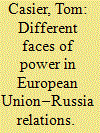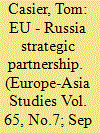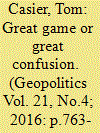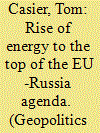|
|
|
Sort Order |
|
|
|
Items / Page
|
|
|
|
|
|
|
| Srl | Item |
| 1 |
ID:
157800


|
|
|
|
|
| Summary/Abstract |
This article applies Barnett and Duvall’s taxonomy of power to European Union (EU)–Russia relations aiming to understand power in its complexity and without a priori theoretical assumptions. Four different types of power – compulsory, institutional, structural and productive – feature simultaneously. It is argued that non-compulsory forms of power are key to understanding the logic of competition in EU–Russia relations in the decade preceding the 2014 Ukraine crisis, despite receiving limited scholarly attention. First, a struggle over institutional power, the capacity to control the conditions of the other actor indirectly, appeared from rivalling integration projects and competing norm diffusion. Secondly, power relations were strongly characterised by constitutive forms of power – structural and productive – in particular the capacity to produce and recognise identities, such as Europeanness. In both fields, the EU held a hegemonic position, which Russia increasingly challenged. The geopolitical reading of the change in regime in Ukraine in 2014 prompted Moscow to a radical change of strategy, by shifting the emphasis in the confrontation to compulsory power. Attempts at direct control, from annexation to sanctions, now dominate relations. Where Russia seeks to prevent the Euro-Atlantic community from gaining effective control over Ukraine through destabilisation, this can be labelled ‘negative’ compulsory power.
|
|
|
|
|
|
|
|
|
|
|
|
|
|
|
|
| 2 |
ID:
122826


|
|
|
|
|
| Publication |
2013.
|
| Summary/Abstract |
Russia-EU relations have often been presented in terms of a normative gap, with the EU appearing as a normative and Russia as a non-normative actor. This article critically analyses this 'normative argument' which sees this gap as the cause of tensions. Pleading for a less dichotomous approach to norms and interests, it challenges the normative argument on the basis of the assumed congruence between the norm-driven input and norm-promoting output of European foreign policy. As an alternative, the article explores how the normative agenda in Eastern Europe serves instrumental purposes. Selective norm promotion has the potential to change the hierarchy of identities among post-Soviet states.
|
|
|
|
|
|
|
|
|
|
|
|
|
|
|
|
| 3 |
ID:
150530


|
|
|
|
|
| Summary/Abstract |
This article explains why a considerable part of the International Relations literature frames highly complex energy relations between the EU and Russia in terms of simple, exclusive geopolitical intentions. Drawing on Construal Level Theory, it addresses the gap between immediate interaction between various private and public actors with their own agendas and individual intentionalities and assumed collective geopolitical intentionalities. Because of the degree of abstraction, collective motivations are attributed to actors like Russia and the EU. This attribution risks to be subject to bias. It is argued that higher psychological distance increases the likelihood of more radical and ideologised framing. These abstract schemes do not follow from the endogenous energy dynamics but are function of a broader logic of competition which has characterised EU-Russia relations.
|
|
|
|
|
|
|
|
|
|
|
|
|
|
|
|
| 4 |
ID:
072697


|
|
|
|
|
| Publication |
2006.
|
| Summary/Abstract |
This article argues that Russia's foreign policy towards the West has acquired a relatively high level of continuity over the last few years. When Putin came into power he kept Primakov's foreign policy concept largely intact, but increased its pragmatic character. Under his presidency economic concerns and multilateralism became the leitmotiv. It is argued that this pragmatic character of Russian foreign policy is not pragmatism by default, but a deliberate choice consistent with the country's national interests. Its roots are related to Russia's lack of means to exert pressure and the priority of internal reforms, which make it essential for Russia to avoid international isolation. In the second part, the article evaluates the success of this pragmatic policy by looking at Russia's integration into the world economy and its relations with key players such as the European Union and the United States. This reveals how the nature of Russian foreign policy towards the West has fundamentally changed and shifted away from zero-sum thinking.
|
|
|
|
|
|
|
|
|
|
|
|
|
|
|
|
| 5 |
ID:
106740


|
|
|
|
|
| Publication |
2011.
|
| Summary/Abstract |
Over the last decade we have witnessed an increasing politicisation of the energy discourse. Today energy relations of the EU are framed in terms of excessive dependence on Russia, qualifying the latter as a security threat. This article puts forward four criteria to define energy relations in security terms: supply vulnerability of the EU, the absence of Russian demand dependence, the dominance of energy over other capabilities, the willingness to link energy to foreign policy objectives. Little support is found to define the dependence on the import of Russian energy resources as a security issue. An alternative explanation is given, attributing growing energy concerns to shifting identities and perceptions in EU-Russia relations, which have contributed to understanding energy relations in competitive and geopolitical terms. Russia has developed a more assertive energy diplomacy, while in the EU sensitivity over energy dependence has grown as a result of changes on the global energy market and of the 2004 enlargement.
|
|
|
|
|
|
|
|
|
|
|
|
|
|
|
|
| 6 |
ID:
191676


|
|
|
|
|
| Summary/Abstract |
The conflict between Russia and the Euro-Atlantic Community has taken the form of a systemic crisis, in which we face the risk of running from incident to incident. It is argued that the European post-Cold War order has undergone a norm-transforming, rather than norm-governed change. The normative framework and shared purpose on which it rests and which are essential to stabilise and perpetuate an international order have been eroded. The crisis is assessed on the basis of both the acts of violation and retreat by key ordering agents and their intersubjective assessment of the order. It is argued that normative pillars have gradually dissolved in four key areas: the principles of the Paris Charter on the indivisibility of security, the arms control regime, collective security and the European border regime. Tackling these issues is particularly complicated, because some, such as arms control, require today a global approach, involving China.
|
|
|
|
|
|
|
|
|
|
|
|
|
|
|
|
| 7 |
ID:
163654


|
|
|
|
|
| Summary/Abstract |
After Russia’s retreat from the European Neighbourhood Policy, the EU’s policy towards its eastern neighbours was split up. The internal unintended consequence of the EU’s choice to leave its policy unaltered was a tension between the objective of privileged relations with ENP countries and a promise to recognise the interests of Russia as an equal partner. Externally, the unintended outcome was that this fostered two opposing strategic environments: a cooperative one for the EaP and a competitive one with Russia. In terms of the management of unintended consequences, the EU has actively sought to reinforce its normative hegemony towards EaP countries, while at the same time mitigating certain negative unintended effects.
|
|
|
|
|
|
|
|
|
|
|
|
|
|
|
|
| 8 |
ID:
188301


|
|
|
|
|
| Summary/Abstract |
Drawing on the theory of script formulations, this essay explores why, in 2013–2014, the EU and Russia clashed over Ukraine but not over Armenia by analysing the evolution of discursive dynamics and the attribution of accountability between both actors. It argues that the positions of Russia and the EU were not simply a function of a priori defined strategic interests and expectations but were codetermined by and through the events and actions of others. The essay contributes to a better understanding of the non-linear dynamics behind the escalation of tensions between the EU and Russia.
|
|
|
|
|
|
|
|
|
|
|
|
|
|
|
|
|
|
|
|
|